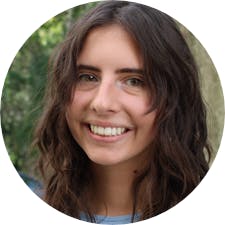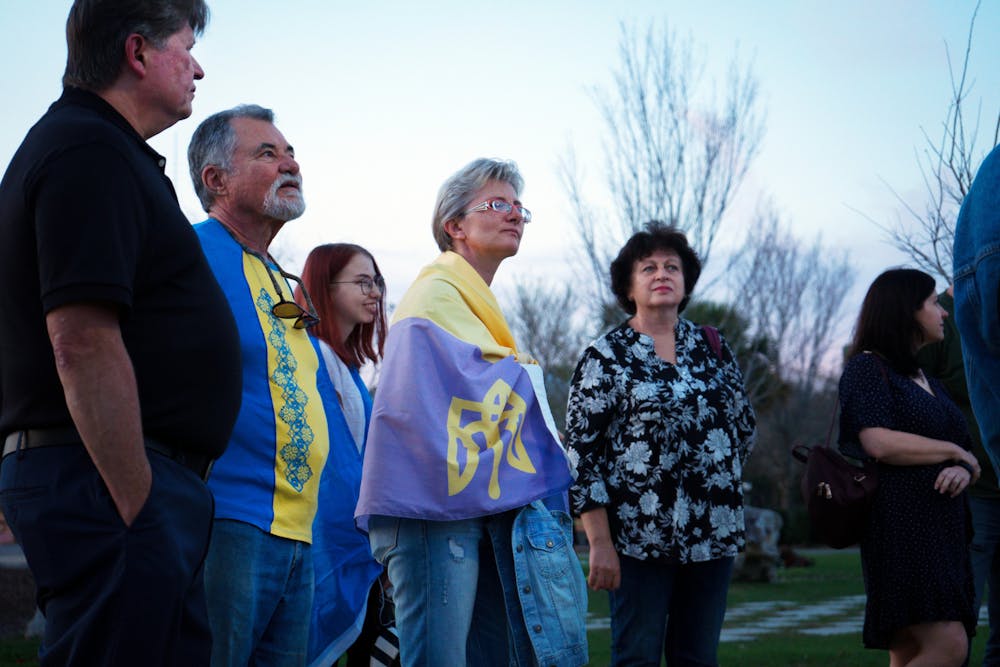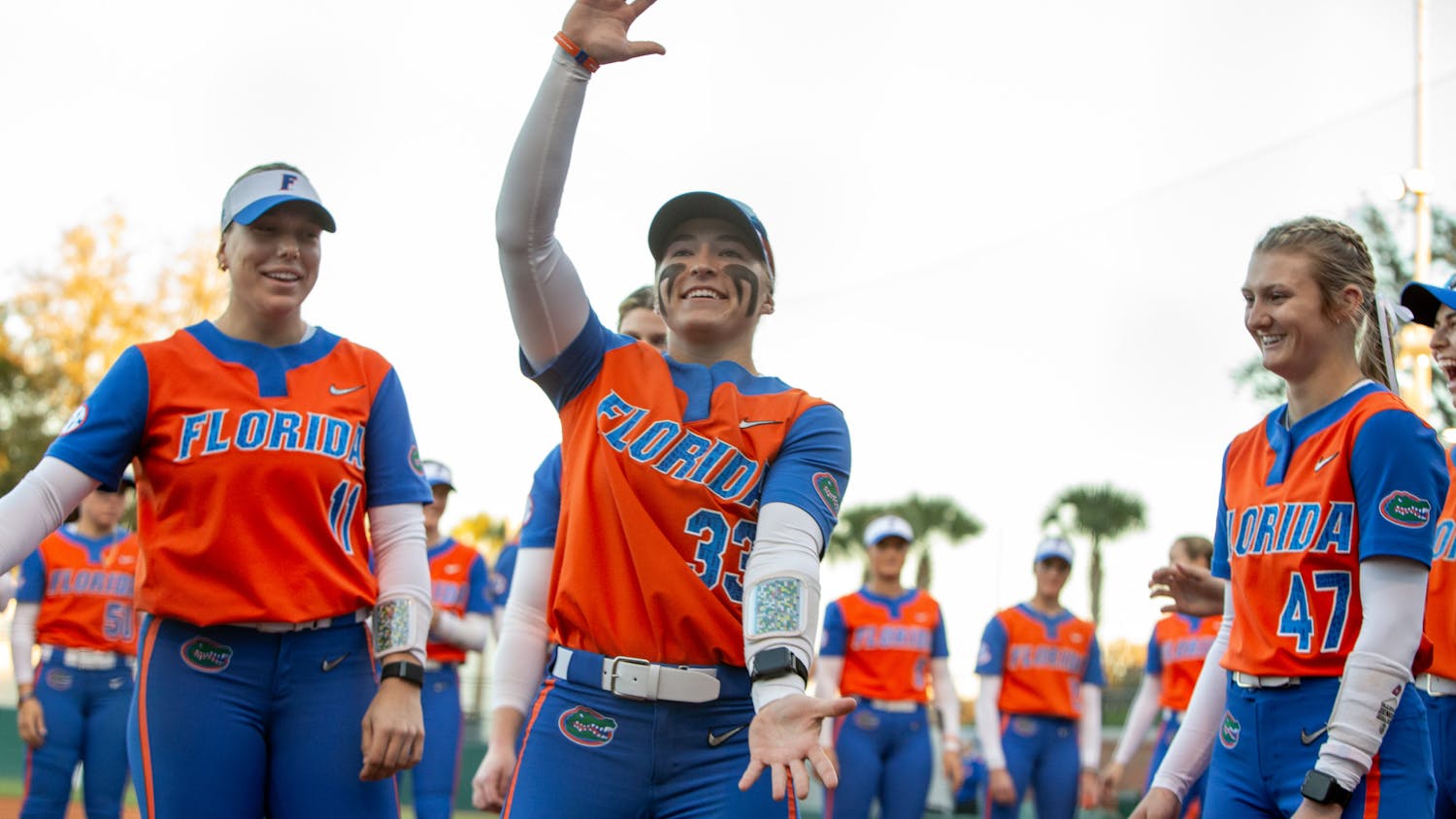After losing everything when her home of Luhansk, Ukraine, was occupied by pro-Russian separatists in 2014, Natalia Pluzhnyk moved to Severodonetsk, Ukraine. There, she worked on the front lines of the war in eastern Ukraine as a volunteer — all while being terrified Russia would try to seize her home again.
To ensure the safety of her teenage daughter and provide her with an opportunity to attend college, she moved to Gainesville in 2017.
“I didn’t see any prospects of a safe future,” Pluzhnyk said.
Pluzhnyk, now a 47-year-old Gainesville resident, has witnessed all three cities where she lived in Ukraine — Luhansk, Severoddonetsk and her hometown Bakhmut — be destroyed in 2022.
For many Americans, Feb. 24 is the date the war between Russia and Ukraine began. However, for Ukrainians, this date is only a reminder of conflict that’s gone on for nine years.
Even thousands of miles away, Pluzhnyk fears for the state of her home country one year after Russia launched a full-scale invasion of Ukraine, but she has found support and comfort from fellow Gainesville residents, she said.
“I felt and feel the support of the local community every day,” Pluzhnyk said.
On Feb. 24, 2022, hundreds of thousands of Russian soldiers invaded Ukraine, and airstrikes targeted major cities. Russia’s invasion caused Europe’s fastest-growing refugee crisis since World War II, according to the United Nations.
Since that day, the UN estimates show the invasion has left at least more than 8,000 civilians dead and over 13,000 injured. Nearly 18 million people are in need of humanitarian assistance, and around 14 million have been displaced from their homes.
Mark Milley, the most senior U.S. military general, estimated in November 2022 that around 100,000 Russian soldiers and 100,000 Ukrainian soldiers had been killed or injured in the war by that point.
To commemorate the anniversary and honor the lives lost in the war, Ukrainian members of the community held different events throughout Feb. 24.
About 50 members of Gainesville’s Ukrainian community gathered at Depot Park to spend time supporting each other. Attendees brought Ukrainian flags, food and candles to light in memory of the lives lost during the past year.
Earlier in the day, about 40 people including UF students, professors and community members gathered in the Plaza of the Americas to commemorate the anniversary at a “365 Days of Defending Freedom” event. The UF Ukrainian Student Association held the demonstration and displayed 52 photos from the invasion — one from each week of the past year.
Oleksandra Nelson, a 20-year-old UF microbiology and cell science junior, led the event’s organization as the UF Ukrainian Student Association president.
When Nelson arrived on campus, she wished for a circle of people with a similar background. It wasn’t until the invasion that she was able to find a community of Ukrainians, she said.
“We quickly mobilized as a community, and I feel it provided a great amount of comfort to all of us,” Nelson said. “Especially at the beginning of the war when we all felt intense fear and uncertainty.”
The Ukrainian community Nelson found helps her stay motivated to continue holding fundraisers and educating the Gainesville community about her culture, she said.
Although Nelson is far away from Ukraine, she believes it’s important to do her part by educating the community while her friends and family risk their lives on the front lines of the war, she said.
“These people do not get tired of risking their lives to defend the future of their country,” Nelson said. “So, we cannot get tired of doing our work on the educational front and raising money to support them.”
Many Gainesville residents have worked beyond the past year to provide aid to Ukraine.
William Wharton, a 91-year-old Gainesville resident, has visited Ukraine about 100 times to conduct Bible teachings and offer humanitarian aid.
His wife, Lyubov Wharton, a 65-year-old Ukrainian Gainesville resident, said she often came with him; the last trip the couple took to Ukraine together was in 2017 and Lyubov’s last trip was in 2021.
The Whartons frequently talk about returning to Ukraine but don’t know when they’ll be able to make the trip.
Lyubov’s sister and other family members still live in Ukraine, she said. She was able to communicate with her friends and family, until the past week after a school in the Bakhmut area that was home to a power generator used to charge phones was bombed.
“Since then, I was not able to get connected with anybody because that was the source of people charging their phones,” Lyubov said. “So, I have not talked with anybody.”
Within the University City Church of Christ, the Whartons are able to support those in the country by coordinating donations from the church to Ukraine.
“We’ve sent over 7,000 pounds of clothing, bandaging, peanut butter and other things to people who have nothing at this point,” Lyubov said.
One of the most important items they have been trying to donate is clothing that will keep citizens warm. Gainesville residents and organizations, including consignment store Flashbacks Recycled Fashions, have donated clothes, she said.
“We hear from other churches and other groups, and when they ask, we tell them what we know about the needs of people,” William said.
Kseniya Chumachenko, a 27-year-old Gainesville resident, who was born in Odessa, Ukraine, attended the demonstration at UF Feb. 24. She finds it heartwarming when non-Ukrainians join demonstrations and offer words of support, she said.
“Sometimes that’s all it takes to know that we are not alone,” Chumachenko said.
Chumachenko encourages everyone in the community to help by doing small activities such as sharing updates on the war on social media, donating or being a conscientious voter, she said.
After leaving Ukraine during her childhood, Chumachenko lived in Illinois and Kansas. Six months ago, she moved to Gainesville to work at UF as a biological scientist and has been able to quickly find a community of Ukrainians that offers each other support.
“It helps for us to talk among ourselves in our native language, Ukrainian, and be there for each other,” Chumachenko said.
Contact Claire at cgrunewald@alligator.org. Follow her on Twitter @grunewaldclaire.

Claire Grunewald is a fourth-year journalism major and the Spring 2024 Editor In Chief of The Alligator. In her free time, she likes to go to concerts and attempt to meet her Goodreads reading goal.






